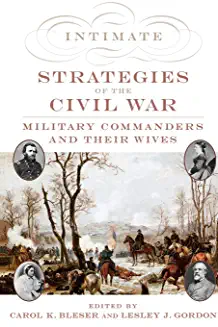Considering your own marriage or relationship, how much influence does your spouse/significant other have over your professional life? With that in mind, have you ever wondered how much impact a wife has had on a famous historic figure?
Occasionally, such an example comes to light. It’s been established that Woodrow Wilson’s second wife Edith played a large role in running the country after the President suffered a stroke in 1919. But such cases are frequently sidelined and forgotten.

That’s what drew me to Intimate Strategies of the Civil War: Military Commanders and Their Wives by Carol K. Bleser and Lesley J. Gordon. These authors examine the marriages of twelve commanders, six from the North and six from the South, and the impact the wives had on their husbands’ careers and legacies.
Some wives, like General John Fremont’s Jessie, were active participants and enthusiastic promoters of their husbands. Others, like General Ulysses Grant’s Julia (coincidentally a Southerner and former slave owner) were a stabilizing influence throughout their lives. Many of these wives, like General Thomas “Stonewall” Jackson’s Mary Anna, outlived their husbands and devoted their own remaining time to solidifying their reputations and memory.
In addition to exploring the relational dynamics, some interesting tidbits emerge. At times, Confederate President Jefferson Davis was too ill to work and his loyal wife Varina stepped in to keep his administration running smoothly, to the point of convincingly forging his signature. My favorite story was General George Custer’s anguish over losing a satchel of his wife’s letters while escaping an ambush. Not only did he regret the loss of correspondence, but some of the missives contained graphic details of the couple’s love life, which he was sure would be gleefully read by Confederates.
This book is an entertaining read for anyone interested in historical relationships, and once again illustrates how much of history never makes it into mainstream textbooks.
